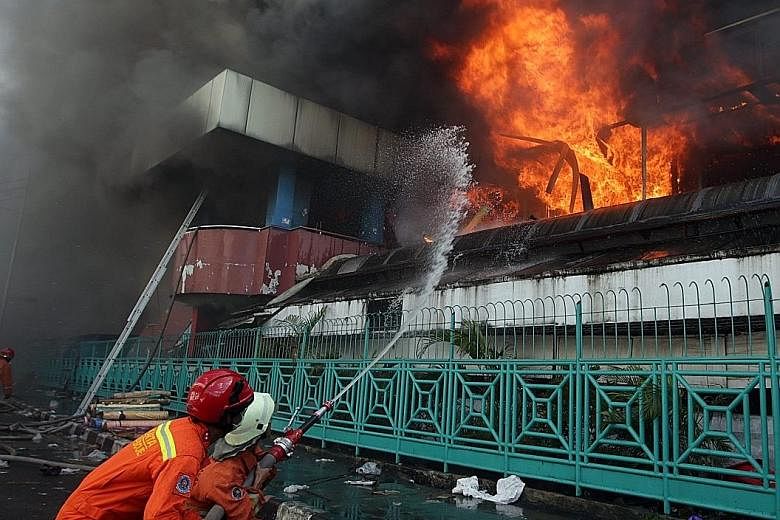A massive fire broke out in a historic market in Jakarta popular for second-hand goods last week, in the latest blaze to hit the country's traditional markets.
Some 1,600 vendors were affected after the blaze gutted two blocks in the sprawling Pasar Senen complex in the wee hours of Jan 19. Many poured onto the streets outside to peddle whatever they had salvaged from their shops and supplies from merchant friends.
This is the eighth time the market, popular with shoppers looking for cheap, second-hand goods, including those from Singapore, has been hit by a fire since 1974, with the previous one taking place just three years ago.
Bookshop owner Ilham, 47, told The Straits Times he rushed to Pasar Senen on his motorcycle after a friend called him at 4am to tell him the bad news. "I live nearby so I could see the flames and smoke from my house. I couldn't save anything when I got there as the fire was spreading too fast and it was dangerous," he said.
Mr Ilham said he and his family had been renting eight units there for the past eight years, and lost 250 million rupiah (S$26,800) .
"I'm hoping the management will give us temporary shop space here while we wait for the blocks to be repaired or rebuilt. I hope they won't tear it down," he said.

Fires are not uncommon in Indonesia's traditional markets, typically a warren of narrow walkways and small shops spilling with textiles, shoes and fresh produce. Many fail to meet minimum safety standards, lacking basic equipment such as fire extinguishers and water sprinklers, observers said.
The latest blaze has prompted the Jakarta administration to mention plans to audit the safety of all market buildings in the capital.
Despite being a fire hazard, these traditional markets make for lucrative businesses for vendors as rents are low, typically under $100 a month for a unit, and human traffic is high. So, despite the frequent fires, which can be caused by anything from an electrical short circuit to arson, traders put up with them.
Just ask the Pasar Senen vendors.
Despite a string of fires, vendors like Mr Ilham are not ready to see the 50-year-old market go. There has been talk that the market, built when Indonesia was under Dutch colonial rule, might be demolished to make way for a shopping mall when the tenants' licences expire in June.
"We are all small-timers. We make just enough to feed our families, so how can we afford to pay sky-high rental fees?" said long-time vendor Lastri, 50, who has been paying $90 a month in rent. She started out by selling nasi padang at the market in her teens before switching to second-hand clothes in the mid-1990s.
Mr Edi Santoso, a coordinator from PT Jaya Real Property which partly manages the market, would not confirm reports that the market faced demolition.
"Our priority now is to relocate the vendors to another block. Our consultants will then assess the damage and let us know if the building is still fit to be used or needs to be demolished," he told The Straits Times.
The vendors' fears of being replaced by a mall are not unfounded, Indonesian Traditional Market Traders Association chairman Hasan Basri said.
While there are still around 15,000 traditional markets across the country, including 161 in Jakarta, the number of Indonesian merchants selling locally made products has shrunk by up to 15 per cent in the last five years, he said.
"Now 60 to 70 per cent of goods in traditional markets are made in China. Large retailers and rich businessmen from China are killing the small, local industry as they are able to afford the high rents," he said.
Several vendors met Deputy House Speaker Fadli Zon last week to seek assistance for solutions, like the provision of temporary kiosks and compensation for destroyed goods.
"They also asked the police to release the result of their investigation on the cause of fire," Mr Fadli told reporters. "We will relay the message to the related parties."
Police investigations are ongoing, but initial suspicion pointed to faulty electrical work.
Some vendors suspect arson.
Used-clothing seller Anton Sinurat, 33, said: "The authorities always say the cause of fire is an electrical short circuit. Isn't it fishy that these fires happen only at night when the market is closed?
"Maybe the fire is deliberately set to shoo us away."
Mr Hasan said that there have been many cases of fires breaking out in traditional markets when "they were about to be revitalised", but small-time traders with their limited resources "can never prove arson".
Shoppers interviewed just hope that the market will be preserved.
Housewife Riamah, 44, said she has never shopped anywhere but Pasar Senen for the past two decades, spending $3 a month to buy clothes for her construction worker husband and their three children.
"I have nothing against development and progress, but I'm too poor to buy new clothes. Everything our family wears is second-hand," she said. "I'm not asking for much. I hope the government and rich corporations won't forget the needs of low-income people like us."

